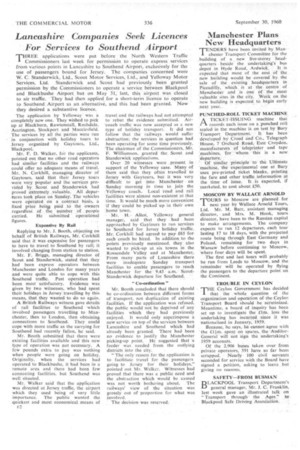Lancashire Companies Seek Licences • For Services to Southend Airport
Page 78

If you've noticed an error in this article please click here to report it so we can fix it.
THREE applications were put before the North Western Traffic A Commissioners last week for permission to operate express services from various points in Lancashire to Southend Airport, exclusively for the use of passengers bound for Jersey. The companies concerned were W. C. Standerwick, Ltd., Scout Motor Services, Ltd., and Yelloway Motor Services, Ltd. •Standerwick and Scout had previously been granted permission by the Commissioners to operate a service between Blackpool and Blackbushe Airport but on May 31, 'lal, this airport was closed to air traffic. They had then applied for a short-term licence to operate to Southend.Airport as an alternative, and this had been granted. Now they desired a substantive licence.
The application by Yelloway" was a completely new one. They wished to pick up at Blackburn, Rawtenstall, Rochdale, Accrington, Stockport and Macclesfield. The services by all the parties were run in conjunction with holiday tours to Jersey organized by Gaytours, Ltd., Blackpool.
Mr. F. D. Walker, for the applicants, pointed out that no other road operators had similar facilities and the railways could offer no adequate means of travel. Mr. N. Corkhill, managing director of Gaytours, said that their Jersey tours were very, popular and the services provided by Scout' and Standerwick had proved extremely .valuable. All departures took place on Sunday. The vehicles were operated on a contract basis, a fixed price heiqg paid to the owners regardless of the -number people carried. He submitted operational figures.
Expensive By Rail Replying to Mr. J. Booth, objecting on behalf of British Railways, Mr. Corkhill said that it was expensive for passengers to have to travel to Southend by rail; it involved changing from station to station.
Mr. F. Briggs, managing director of Scout and Standerwick, stated that they had been express operators between Manchester and London for many years and were quite able to cope with this Southend traffic. Past operation had been most" satisfactory_ Evidence was given by two witnesses, who had spent their. holidays in Jersey' travelling by this means, that they wanted to do so again.
A British Railways witness gave details of rail facilities to Southend which involved passengers travelling to Manchester, then to London, then obtaining connections to Southend. They could cope with more traffic as the carrying for Southend had recently fallen,' he said.
Mr. Booth submitted that there were existing facilities available and this new type of operation was not necessary. A few pounds extra to pay was nothing when people were going on holiday. Originally, when the services had operated to Blackbushe, it had been in a remote area and there had been few connecting facilities, but Southend was well situated.
Mr. Walker said that the application was directed at Jersey traffic, the airport which they used being of very little importance. The public wanted the quickest and most economical means of
r2
• travel and the railways had not attempted to rebut the evidence submitted. Air'coach traffic was now accepted as a new type of holiday transport. It did not follow that the railways would suffer abstraction; the services in question had been operating for some time previously. The chairman of the Commissioners, Mr. F. Williamson, granted the Scout and Standerwick applications.
Over 20 witnesses were present in support of the Yelloway case. Many of them said that they often travelled tb Jersey with Gaytours, but it. was very • difficult to get into. Manchester on Sunday morning in time to join the -Yelloway coach. Local road and rail facilities were altnost non-existent at that time. It would be much more Convenient if they could be picked "up in their own home town.
'Mr. H.Allen, Yelloway general manager, said that they had been approached by Gaytours to run services to Southend for Jersey holiday traffic. Mr. Corkhill had agreed to pay. £65 for each coach he hired. in addition.to the points previously mentioned, they also wanted to pick-up at six towns in the Rossendale Valley and at Manchester. From many parts of Lancashire there were inadequate Sunday transport facilities to enable passengers to reach Manchester for the 9.45 a.m. • ScoutStanderwick departure for Southend. •
" Co-ordination "
Mr. Booth concluded that there should he co-ordination between different forms of transport, not duplication of existing facilities. If the application was refused, the public would not be deprived of any facilities which they had previously enjoyed. It would only superimpose a new service on top of the services between Lancashire and Southend which had already been granted. There had been no evidence to justify the Manchester picking-up point. He suggested that a feeder was needed from the outlying districts into the city.
"The only reason for the application is to. facilitate travel for the passengers going to Jersey for their holidays." pointed out Mr. Walker. Witnesses had proved that there was a public need and the abstraction which would be caused was not worth bothering about. The railways' view of the situation was grossly out of proportion for what was involved.
The decision was reserved.
























































































































































































